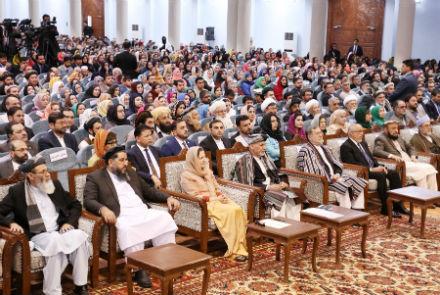The Grand Consultative Jirga for Peace, which was wrapped up after five days on Friday, has faced criticism by some critics, members of the public and even by a number of its delegations.
Almost 3,200 delegates attended Jirga, the grand council, where they issued a 23-Article declaration, mainly stressing on an immediate ceasefire between the Afghan government and the Taliban.
The Jirga was divided into 50 committees who were asked to give their suggestions and recommendations on four main questions relevant to the peace talks with the Taliban.
According to President Ghani, the Peace Jirga resolution will turn into the Afghan government’s “action plan”.
Some delegates said that the election of heads of the committees was not done through a transparent process.
“Every committee had 51 members and from 51 members, almost 48 members of (some) committees were from one province and they elected the head and secretary of the committees through an engineered process,” said Salima Haidari, a delegate.
“Balance was not ensured in the number of delegates invited from the provinces,” said Zuhal Yusufi, a delegate.
Gul Mohammad Tawhidi, a delegate who was taken out of the Jirga hall on the first day of the event during President Ghani’s speech, said the consultative Jirga was a “symbolic” event.
“Elections were held in the committees, but division (of delegates into committees) was not in our control and was done in advance,” said Tawhidi.
Imposing limitations on media was another issue criticized by a number of the delegates during the five days of the gathering. Only the state TV was allowed to report from inside the hall and the Jirga members labeled the move a kind of censorship.
“Almost they all were elders who attend in almost all provincial and other meetings and they have just a symbolic role and had the same role in the Jirga,” said Esmatullah Qane, a political analyst who refused to attend the Jirga.
Organizers of the Jirga, meanwhile, said the grand council was successful and will have positive outcomes for the peace process.
Despite that, there were complaints by Kabul residents over road closures during the Jirga days, President Ghani apologized to the residents and thanked them for their patience during this period.


